Papers by Ebraheem Safabakhsh
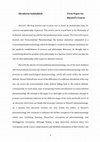
Husserl's lifelong interest and vocation was to found an unshakeable basis for sciences and philo... more Husserl's lifelong interest and vocation was to found an unshakeable basis for sciences and philosophy in general. This motive can be traced back to his Philosophy of Arithmetic and pursued up until his last posthumous book, namely The Crisis of European Sciences and Transcendental Phenomenology. His tireless endeavour culminated in a transcendental phenomenology which he thought it would be the ultimate foundation for the apodictic establishment of sciences and philosophy. Moreover, he thought that it would bring about the promise of the philosophy as a rigorous science which can play the role of a first philosophy with respect to objective sciences. But with the advent of transcendental phenomenology, one of the most stubborn and vital problems becomes the relation of this transcendental phenomenology with the previous so-called psychological phenomenology, which still works within the natural attitude. Husserl himself was aware of the difficulties of a sufficient elucidation of the way one can access the transcendental realm without falling back to the natural attitude. Consequently, he tried many ways of preparing fruitful introductions to transcendental phenomenology. My attempt in this paper is to shed light on his evolutionary attempt to present transcendental reduction in the different stages of his work and finally arrive at an obscurity which does not finally find its proper solution in Husserl's phenomenology. As I assume, this obscurity remains not only within the edifice of Husserl's phenomenology, but continues to influence the further reception of his phenomenology which was vacillating between Husserlian conception of phenomenology and Heideggerian conception.
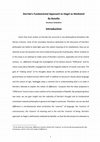
Given that most studies on Derrida has occurred in non-philosophical disciplines like literary cr... more Given that most studies on Derrida has occurred in non-philosophical disciplines like literary criticism, most of the secondary literature dedicated to the discussion of Derrida’s philosophy has failed to shed light upon the radical meaning of his meditations; they are an attempt to put into question the most fundamental grounds of philosophy. What I embark on in this paper is an attempt to make sense of Derrida’s concerns, especially one of his central notions, i.e., différance through the investigation of his famous lecture “Différance” and his classic essay about Bataille’s engagement with the Hegelian dialectic of master and slave. The goal of “making sense” of his thoughts about the conditions of the possibility of sense in general bears an implicit tension within itself. In addition to Saussure’s theses about language and the nature of sign, Heidegger plays a seminal role in understanding what is at stake in
Derrida’s attempt to explain the notion of différance. I propose that the ideas proposed in “Différance” lecture have a close relation to his interpretation of Bataille. By juxtaposing these two texts, we can gain insight into the radicality of Derrida’s thought and its fundamental
orientation towards philosophy in general and Hegel in particular. Therefore, we can see that différance is simultaneously what constitutes the ‘essence’ of language, the ‘essence’ of consciousness, the ‘essence’ of meaning and in the end the ‘essence’ of being. Derrida’s
approach to Hegel is definitively mediated by Bataille, so that Derrida locates his attempts to elucidate différance as a radical transgression of Hegelian philosophy while being a manifestation of the impossibility of transcending it. The transgression becomes possible through revealing the novel meaning of staying within Hegel’s philosophy by being exposed to the excess that cannot be contained within Hegel’s philosophy and his notion of Aufhebung.
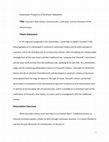
In the argument proposed in this dissertation, I undertake to explain Foucault's new historiograp... more In the argument proposed in this dissertation, I undertake to explain Foucault's new historiography as it is developed in contrast to continuous history and its entire panoply of concepts, and to the founding role of consciousness therein. After elucidating the indispensable entanglement of the new history and the traditional one, I propose that Foucault's new history cannot sever itself entirely from the traditional one, standing on its own feet. As a preliminary stage and the underlying philosophical stance for Foucault's history, I articulate his distinctive theory of truth as inherited from Nietzsche and developed to construct a theory of discourse emancipated from the reign of reason or the logic of sense. Foucault's history can be best illuminated in comparison to the hermeneutical approach to discourse and interpretation and in relation to the founding role of consciousness, which is entailed as a constituent part of the clarification of Foucault's new history, its nature and its entanglement with the traditional history. Dissertation Overview What aims does history serve and how it is to achieve them? Traditional History, as Foucault incisively explains, attains its aims through continuous accounts. It is meant thereby to retrieve the past dimension of consciousness. As he puts it:
Drafts by Ebraheem Safabakhsh
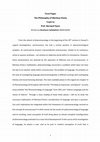
From the advent of phenomenology in the beginning of the 20th century in Husserl's Logical Invest... more From the advent of phenomenology in the beginning of the 20th century in Husserl's Logical Investigations, consciousness has had a central position in phenomenological analytics. As construed by Husserl, transcendental consciousness-thanks to its numerous, active or passive syntheses-can achieve an objective world within its immanence. However, these achievements are attained by the operation of different acts of consciousness. In Merleau-Ponty's meditations, phenomenology encounters a problem which does not have the key to its solution solely within consciousness: the problem of language. He embarks on the task of investigating language phenomenologically in different writings with overlapping themes and recommencing attempts. The main available pieces in this regard are chapter VI of Phenomenology of Perception with the title "The Body as Expression, and Speech", an early essay entitled "the Phenomenology of Language" from 1951 and "Indirect Language and the Voices of Silence". Through a close reading of these three pieces, I will try to draw the necessary implications of Merleau-Ponty's consideration of language and pose a question: Can such implications be integrated within the framework of a phenomenology centered on the concept of consciousness? In other words, do the results of a phenomenology of language and its accompanying, novel conception of truth bring about an almost complete transfiguration of phenomenology and lead it to a new trail of development?

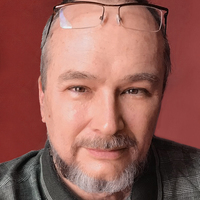








Uploads
Papers by Ebraheem Safabakhsh
Derrida’s attempt to explain the notion of différance. I propose that the ideas proposed in “Différance” lecture have a close relation to his interpretation of Bataille. By juxtaposing these two texts, we can gain insight into the radicality of Derrida’s thought and its fundamental
orientation towards philosophy in general and Hegel in particular. Therefore, we can see that différance is simultaneously what constitutes the ‘essence’ of language, the ‘essence’ of consciousness, the ‘essence’ of meaning and in the end the ‘essence’ of being. Derrida’s
approach to Hegel is definitively mediated by Bataille, so that Derrida locates his attempts to elucidate différance as a radical transgression of Hegelian philosophy while being a manifestation of the impossibility of transcending it. The transgression becomes possible through revealing the novel meaning of staying within Hegel’s philosophy by being exposed to the excess that cannot be contained within Hegel’s philosophy and his notion of Aufhebung.
Drafts by Ebraheem Safabakhsh
Derrida’s attempt to explain the notion of différance. I propose that the ideas proposed in “Différance” lecture have a close relation to his interpretation of Bataille. By juxtaposing these two texts, we can gain insight into the radicality of Derrida’s thought and its fundamental
orientation towards philosophy in general and Hegel in particular. Therefore, we can see that différance is simultaneously what constitutes the ‘essence’ of language, the ‘essence’ of consciousness, the ‘essence’ of meaning and in the end the ‘essence’ of being. Derrida’s
approach to Hegel is definitively mediated by Bataille, so that Derrida locates his attempts to elucidate différance as a radical transgression of Hegelian philosophy while being a manifestation of the impossibility of transcending it. The transgression becomes possible through revealing the novel meaning of staying within Hegel’s philosophy by being exposed to the excess that cannot be contained within Hegel’s philosophy and his notion of Aufhebung.